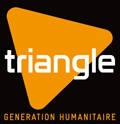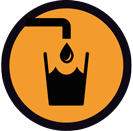May 2022 / May 2023
Emergency response to improve sanitation for Yemeni populations exposed to the ongoing crisis and epidemics
The actions implemented within the framework of the project aim at improving access to water and hygiene knowledge in the districts of Tawahi, Al Maalla and Al Bureiqah through water trucking, rehabilitation of water distribution networks and community hygiene awareness.
Read more...
March 2021 / April 2023
Emergency response to improve sanitation for Yemeni populations
The project aims to respond to the economic difficulties and failings in the water and sanitation services faced by the most vulnerable populations in the city of Aden, in a context of epidemic outbreaks and the resurgence of waterborne diseases.
Read more...
May 2011 / April 2014
Integrated food security project
This program aims to help increase food production through the construction or rehabilitation of protection structures against floods and spate irrigation.
Read more...
January 2009 / December 2011
Development and promotion of a socially and ecologically friendly agriculture
Extending its previous project, TGH continues to provide a proximity support to the groups of market gardeners in Socotra, and follows the products’ marketing as well as the duplication of local seeds.
Read more...
January 2010 / December 2011
Towards the restoration of the farming productive capacities of households
The valley of Tareem has been particularly struck by the floods in October 2008, as was the valley of wadi Sah.
Read more...
January 2008 / May 2011
Integrated Food Safety
Based on a definition of the concept of food security allying food consumption and state of health – a definition stemming from the work of the World Food Security Committee. Marawah district, Hodeidah Governorat
Read more...
January 2009 / June 2011
Integrated economic security project
The still delicate stability of the Governorate of Shabwah is one of the avatars of the area’s economic decline. TGH intervenes within the frame of a three-year project in order to establish improved farming practices and help boost declining agricultural and animal production. Districts of Mayfaah and Rudoom
Read more...
June 2010 / May 2011
Emergency support to victims of the conflict
TGH continues its operations, launched in 2009, for IDPs in Al Mazraq area. While return movements were initiated in 2010, a number of families have stayed in the camps, and do not wish to return to their original villages.
Read more...
June 2009 / May 2010
Towards restoring the farming capacities
In the direct continuity of the first rehabilitation programme also supported by TEPY, TGH is still committed to the cause of the populations living on the banks of wadi Sah, the victims of exceptional floods in October 2008.
Read more...
April 2010 / June 2010
Emergency relief for displaced people in Al Mazraq
Despite the peace agreement signed between the Al Houtis rebels of Saada Province and the Yemenite government, the sixth war triggered further displacement of vulnerable people Al Mazraq refugee camp.
Read more...
November 2009 / March 2010
Emergency support to the displaced populations
Where as the sixth war of the conflict which has been opposing the Al Houtis rebels of the North to the Yemeni government since 2004 intensifies, the flow of displaced civil populations continues unceasingly.
Read more...
January 2007 / December 2008
Further Development of Irrigated Agriculture
This new project, incorporated in Triangle's action on the island of Socotra, involves two new areas: Qalansiya (at the north-west point of the island) and the Nogud Plain (south of the island).
Read more...
January 2006 / April 2007
Supply Drinking Water and Improve Sanitary Conditions
This programme is designed to meet the water and hygiene needs of 10,296 people living in 17 villages in the districts of Al Museimer, Al Madareba, Al Ara and Tor al Baha, all located in a sub-desert area of the Lahej gouvernorat.
Read more...
June 2006 / December 2006
Stimulation of Infant Development
Dar Sa'ad is one of Aden's eight districts and among the poorest; some 80,000 people live there, mainly members of vulnerable communities – Somali and Ethiopian refugees, "Akhdam" groups, Yemeni families with very low income.
Read more...
September 2004 / December 2006
Development of Market-Garden Crops
This programme, launched in November 2004, aims to increase the production of fruit and vegetables in secluded villages on the island of Socotra and thus improve the islanders' nutritional status and food safety.
Read more...
1998 / 2005
Assistance to Somali and Ethiopian Refugees
This aid programme for Somali and Ethiopian refugees was renewed annually from 1998 to 2005.
Read more...
March 2005 / May 2005
Research Project: Water and Sanitation Requirements
This research project, performed in close partnership with two NGOs named Dia and Coopi, had two objectives: improve the definition of priority needs in terms of water and sanitisation; plan future projects for vulnerable populations in the three governorates.
Read more...
March 2004 / February 2005
Supply Drinking Water and Improve Sanitary Conditions
The Wadi Masila is an isolated and forgotten area in East Yemen where the natural and climactic conditions are particularly hostile.
Read more...
November 1999 / October 2003
Rehabilitation of Agricultural Infrastructures
The region of Hadramaout, located east of Yemen suffers from regular flooding. Triangle first intervened in 1999 to protect agricultural land and villages against floods and ground erosion while developing the irrigation system.
Read more...
October 2002 / May 2003
Socotra, an Island between Two Worlds
Directed by Didier Dematons, this 52-minute documentary presents the mechanisms allowing populations to benefit from the humanitarian aid granted by the European Union.
Read more...
July 2000 / April 2001
Rehabilitation of the Waterworks System on the Island of Socotra
Draught, flooding and other severe climatic events have severely damaged the Socotra archipelago, and in response to the European Commission’s Master Plan, we launched rehabilitation and construction of the potable water system in several villages of the Diksam, Momi and Riyad Ilkishin in 2000 and 2001.
Read more...

